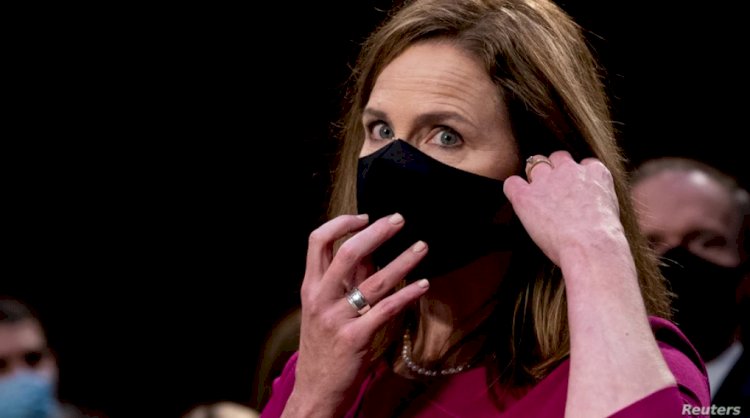Supreme Court Nominee Barrett: Courts 'Should Not Try' to Make Policy
He predicted that all 12 Republicans on the panel would vote for Barrett’s confirmation, with the 10 Democrats uniformly opposed.

Supreme Court Nominee Barrett: Courts 'Should Not Try' to Make Policy
Barrett laid out a strict interpretation of the high court’s role, saying it is "not designed to solve every problem or right every wrong in our public life.”
As the hearings started, Sen. Dianne Feinstein, the lead Democrat on the Senate Judiciary Committee, immediately signaled that the minority Democrats plan to sharply question Barrett about one major policy dispute — her view that a 2012 Supreme Court decision upholding the legality of the Affordable Care Act (ACA), a national health care law affecting millions of Americans, was wrongly decided.
The court is considering a new challenge to the ACA on Nov. 10, by which time Barrett could be a justice on the nine-member court, deciding whether to overturn the statute or allow it to stand.
Wearing a black face mask, Barrett listened as senators made their opening statements regarding her nomination, and when they finished, she offered hers.
The stakes for her nomination are high. The Republican-controlled Senate is looking to confirm her appointment just days ahead of the Nov. 3 national presidential election.
In nominating Barrett, Republican President Donald Trump hopes to cement a 6-3 conservative majority on the court before Election Day. His Democratic challenger in the presidential campaign, former Vice President Joe Biden, insists that either he or Trump should make the Supreme Court appointment after the inauguration in January.
“Voting is under way in 40 states,” Feinstein said, adding, “Let the American people be heard” by delaying consideration of a replacement for liberal Justice Ruth Bader Ginsburg, who died last month.
More than 7 million voters have cast early ballots in the presidential election. A Washington Post-ABC News poll showed that 44% of registered voters say the Senate should hold hearings and vote on Barrett’s nomination, while 52% say the nomination should be left to the winner of the presidential election and a Senate vote next year.
In his opening remarks, Republican Sen. Lindsey Graham, chairman of the Judiciary Committee, said the hearings would be “a long, contentious week,” but added, “I think I know how the vote will come out.”
He predicted that all 12 Republicans on the panel would vote for Barrett’s confirmation, with the 10 Democrats uniformly opposed.
Trump complained Monday on Twitter about the Democrats' objections to the nomination.
“The Republicans are giving the Democrats a great deal of time, which is not mandated, to make their self-serving statements relative to our great new future Supreme Court Justice,” Trump tweeted.
Barrett is a devout Catholic, but Biden said Monday her "faith should not be considered. No one’s faith should be questioned.”
Republican leaders say they have enough votes in the full Senate to confirm Barrett’s nomination days before the election, a stance at odds with their position in 2016 when they refused to consider former Democratic President Barack Obama’s nomination of Judge Merrick Garland that came eight months before the presidential election that Trump won.
“The bottom line is the Senate is doing its job” in considering Barrett’s nomination, Graham said. “I feel we’re doing this constitutionally.”
Republicans say their push to confirm Barrett is in line with 17 of 19 past election-year Supreme Court nominations throughout U.S. history, because the White House and Senate were controlled by the same political party, as is the case now.
Feinstein noted that before Trump named Barrett to a federal appellate court judgeship in 2017, she wrote a law review article contending that Chief Justice John Roberts cast the deciding vote upholding the health care law with what she claimed was contorted reasoning so that the law would remain in effect.
Barrett claimed that Roberts pushed the interpretation of the law “beyond its plausible meaning to save the statute.”
“I hope you will clarify that in this hearing,” Feinstein said in her opening statement. The 48-year-old nominee, however, has declined in conversations with lawmakers in recent days to tip her hand on how she might vote on any case that might come before her if she is confirmed.
The ACA, popularly known as Obamacare, won congressional approval in 2010 over the unanimous opposition of Republicans, who have sought since then to invalidate it.
After opening day remarks by the 22 Judiciary Committee members, they plan to question Barrett on Tuesday and Wednesday. Testimony for and against her nomination is set for Thursday.
Democrats, including vice-presidential nominee Kamala Harris, will assuredly question her about the health care law, as well as whether Barrett, an abortion rights foe in her writings, will seek to overturn the court’s landmark 1973 ruling legalizing abortion rights in the United States.
Harris, Biden’s running mate, said in her opening statement that Republicans “are trying to get a justice onto the court in time to ensure they can strip away the protections in the Affordable Care Act. And if they succeed, it will result in millions of people losing access to health care at the worst possible time in the middle of a pandemic.”
In her opening statement, Barrett talked about her husband and seven children, two of whom they adopted from Haiti, and then delved into her view of how a judge should rule in cases. She has said a judge should be someone who interprets the words of the U.S. Constitution and laws as written, not as how they personally might like the outcome of a legal dispute to be.
Instead, she said in her statement Monday, “The policy decisions and value judgments of government must be made by the political branches elected by and accountable to the people. The public should not expect courts to do so, and courts should not try.”
Senate Majority Leader Mitch McConnell is pushing to see Barrett confirmed before the election while his party still holds the Senate and the White House, something that could change with the election, if Biden wins and Democrats take control of the Senate in January. Even so, no matter the election results, Republicans will still control the Senate in the post-election session of Congress and could confirm Barrett then if they fail to do so before the election.
“President Trump has been trying to throw out the Affordable Care Act for four years. Republicans have been trying to end it for a decade,” Biden said in a statement. “She has a written track record of disagreeing with the U.S. Supreme Court’s decision upholding the Affordable Care Act.”
Barrett’s confirmation would likely result in a distinct conservative ideological edge on the court that could shape American law for decades on such issues as health care, abortion and gay rights, immigration and gun restrictions. Court analysts say Barrett would likely be a polar opposite vote on the court to Ginsburg, a liberal icon.
Referring to Ginsburg in her statement, Barrett said, “No one will ever take her place.”
But Barrett held out the late Supreme Court Justice Antonin Scalia, a strict constitutionalist, as her mentor, a jurist who adhered to the words in the U.S. Constitution when it was adopted.
Barrett said Scalia, for whom she was once a law clerk, was "devoted to his family, resolute in his beliefs and fearless of criticism."
VOA











































